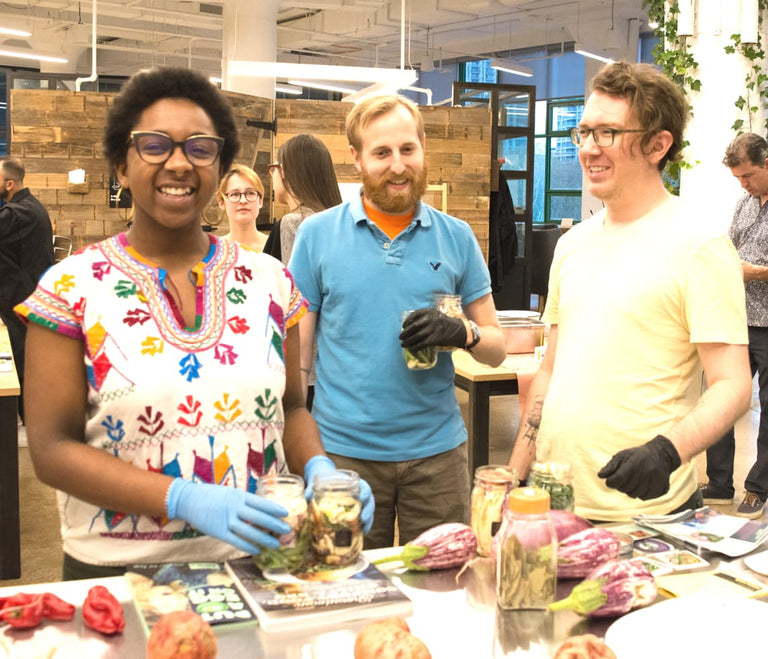Farming in the Era of Climate Change: An Interview with Lauren Nagy of Ironbound Farm
The Northeast is warming faster than any other region in the United States, and the effects are felt on our farms. As a result of continually increasing greenhouse gases in our atmosphere, farmers are experiencing unpredictable weather and temperatures, which greatly affect their crop and yield.
We spoke with Lauren Nagy, a yoga instructor, herbalist and farmer at Ironbound Farm in New Jersey about the ways she’s seen climate change first-hand at Ironbound and throughout her 8 years working on farms.

Ironbound Farm is a 108-acre organic farm in New Jersey that is dedicated to growing healthy food produced using resilient ecological stewardship. The crew uses regenerative farming practices to manage vegetable crops and an extensive orchard of heritage cider apples, vegetables, and livestock.
On Witnessing and Responding to Climate Change on the Farm
For Laura, the most visible climate change on the farm is seen in the inconsistency of the seasons. Every year now is totally different, and it’s getting harder and harder to predict and prepare for what’s to come. While some years they’ve had rain that floods the farm, others it’s completely dry and extremely hot.
The early springs and unusually warm winters have been particularly challenging for Ironbound Farm. For example, this past February, we had days that reached 60 or 70 degrees, which can be detrimental to the perennials (fruits and berries). When it gets this warm, these plants begin to flower prematurely, these flowers are what eventually become fruit. But, when another inevitable cold front passes through, the flowers are frozen and destroyed. This greatly affects the fruit yield on the farm. In response, this year the orchardist at Ironbound attempted to keep their orchard warm by lighting fires, in hopes it might keep the flowers warm enough to survive, but they didn’t find huge success.
Deep freezes are vital to the health and survival of plants, Lauren explains. Diseases and harmful insects often die off in the cold, so mild winters mean these pests survive into the summer. In response, they’ve tried to rotate crops to “confuse” insects. They also release “good” insects that can either eat or kill the pests that destroy their crops.
Overall though, the best way to ensure the health and survival of the crops is to take care of the soil. Plants have an immune system of their own if they have proper nutrients, which is found in soil that is rich with living bacteria, fungi and other nutritional elements. Healthy soil makes for healthy, resilient, tasty crops. (Learn more about the relationship between soil and taste here!)
Ironbound works with a number of multi-generational farmers in the area, and an overwhelming number of them are similarly struggling to produce apples, specifically. Folks who have been farming their whole lives are saying that this kind of inconsistency in the seasons is something that they’ve never really seen or experienced before.

On Working Against Long Term Climate Change
Lauren told us that one of the keys to long term success is diversity, noting that no matter what the changing conditions are, no matter what pests and diseases come along, “as long as we have lots of different plants and animals and different means of feeding ourselves and our community”, there will always be food to eat. At Ironbound, they’ve focused on growing great varieties of produce. For example, they grow about 20 different types of winter squashes, and about 40 varieties of tomatoes, each with their own environment and background.
They’ve also added livestock to the farm, including chickens and turkeys, and hope to add hogs and goats next year. “It’s important to be able to produce a well-rounded diet on the”, Lauren mentions. This is important for both the farm's survival and the communities. This concept was made even more necessary in the wake of COVID-19, which exposed the various holes in our commercial supply chain, and made an even stronger case for diverse dietary options and products produced close to home.
On the Importance of Understanding Where Your Food Comes From
Lauren runs the Ironbound Farm CSA, and she said she’s noticed more and more people's misunderstanding or lack of information about how their food is grown and what eating locally really means. One of the best ways to support a healthy climate long term is to eat seasonally. Lauren suggests that “as a whole, you need to tune into where your food comes from, where you’re placed in the ecosystem.” For example, eating summer crops in the winter can actually be quite harmful to the environment, as these products have usually traveled thousands of miles to reach you and are often grown in energy-draining conditions such as hot-houses, which use huge amounts of electricity to run.

While bananas, mangos and citrus fruits are fun, if you live in the Northeast, these will never be part of your seasonal local diet. “Understand what climate you live in and let that inform how you eat”, Lauren encouraged. She left us with this final piece of wisdom —understanding your connection to the earth and the place you live can be beneficial to the climate, but also benefits our bodies and our communities. Connection and respect for earth is especially necessary at this time.
Article by Local Roots Content Volunteer Sylvie Florman
Rather have a taste first?
Local Roots Experiences are fun, pop-up events where we bring the farm to you!

Become a Harvest Club Pick Up Location
Are you a NY based cafe, bar, or neighborhood business? Become a Harvest Club pick up location and have community members come to your establishment each week to pick up their Local Roots harvest.
Top






